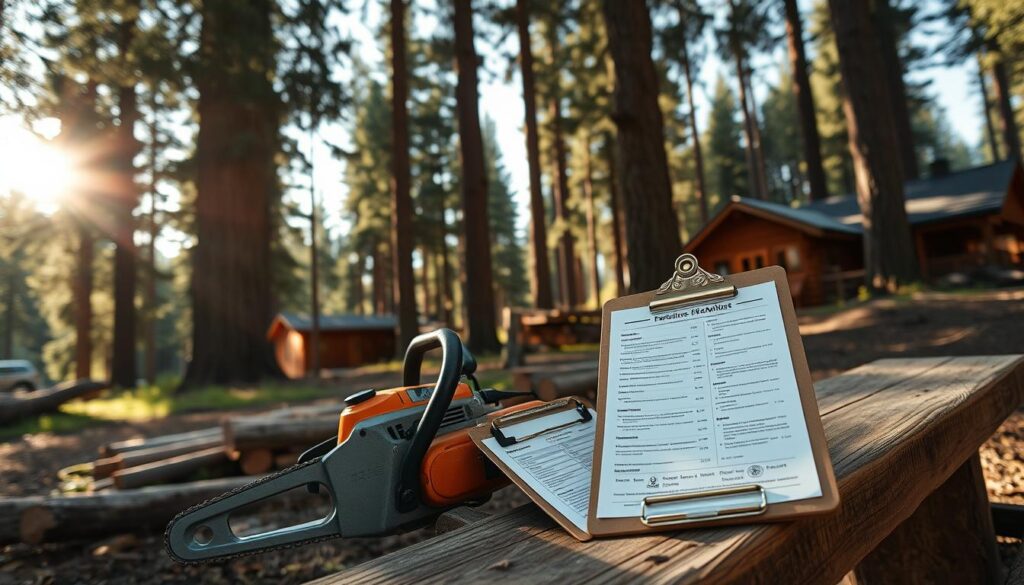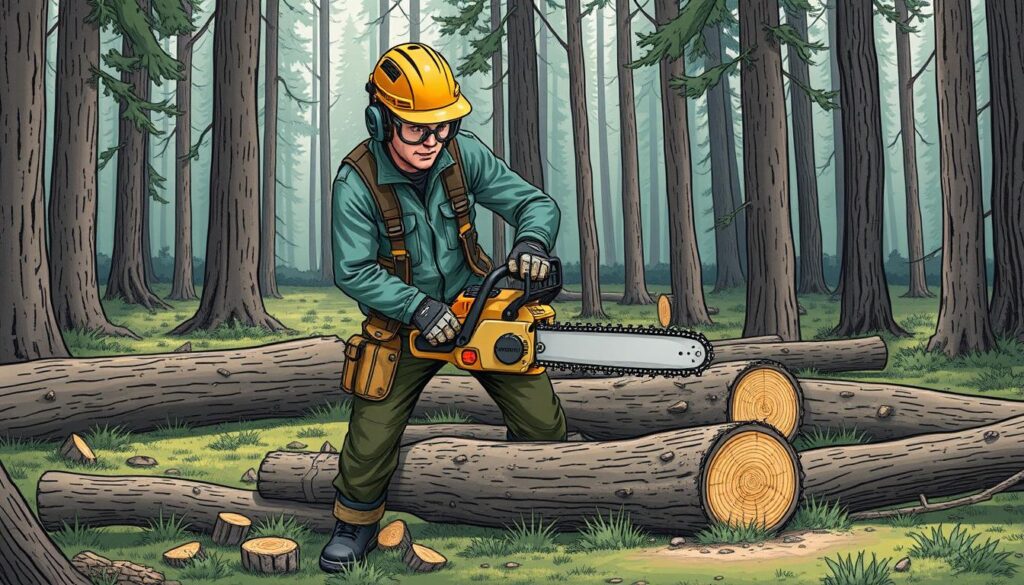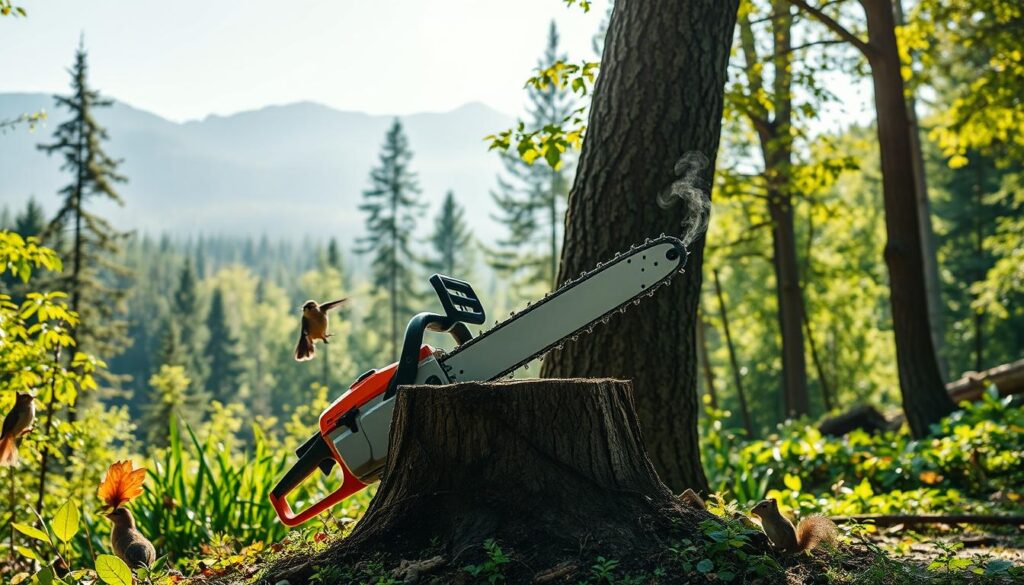If you live in Bonner County, Idaho, you need to know the laws about chainsaws. This is true for homeowners, forestry workers, and tree trimmers. Knowing the county’s rules helps keep everyone safe.
This article will tell you all about Bonner County’s chainsaw laws. We’ll talk about getting permits and following safety rules. By learning these rules, you can use chainsaws the right way.
Key Takeaways
- Bonner County has specific laws and regulations governing the use of chainsaws for forestry and logging activities.
- Understanding these local laws is crucial to maintain compliance and ensure the safety of the community.
- The article covers the key requirements, permits, and guidelines you must follow when operating a chainsaw in Bonner County.
- Familiarizing yourself with the Bonner County chainsaw regulations can help you conduct your forestry activities responsibly and legally.
- Staying informed about the latest updates and changes to these laws is important to avoid potential fines or legal issues.
Understanding Bonner County’s Chainsaw Regulations
If you live in Bonner County, you need to know the rules about chainsaws. These laws keep everyone safe and protect the environment. They also help manage the forests well.
Why These Laws Matter
The rules about chainsaws are very important. They keep people safe and prevent harm. They also help keep the natural world and animals safe by controlling logging.
Overview of the Key Requirements
The main rule is that you must be certified to use a chainsaw. You need to learn how to use these tools safely. This training is very important.
You also need a tree removal permit for any tree work. This permit helps the county keep things in order. It makes sure the rules are followed.
| Regulation | Description |
|---|---|
| Chainsaw Operator Certification | Mandatory training and certification for all chainsaw operators |
| Tree Removal Permits | Permits required for any logging or tree-related work |
| Logging Site Requirements | Guidelines for the establishment and maintenance of logging sites |
| Woodland Management Rules | Regulations to ensure sustainable and responsible forest management |
Following these rules helps keep Bonner County beautiful. It also keeps everyone safe.
Obtaining the Necessary Permits
Before you use a chainsaw in Bonner County, Idaho, you need to get the right permits and certifications. This makes sure you follow local chainsaw permits idaho rules. It also helps you use forestry equipment safely. Let’s look at how to get your paperwork ready.
Chainsaw Operator Certification
The first thing to do is take a logging equipment guidelines chainsaw training course. These courses teach you how to handle chainsaws right, how to keep them in good shape, and safety rules. After you finish, you get a certificate. This lets you legally use a chainsaw in Bonner County.
Tree Removal and Logging Permits
If you plan to cut down trees or do timber harvesting best practices, you’ll need more permits. You have to get these from local authorities. These permits make sure you follow Bonner County’s forestry equipment guidelines and protect the environment.
Getting the right permits and certifications means you can use your chainsaw in Bonner County safely and legally. It also helps you follow timber harvesting best practices. Make sure you know the local rules to stay safe and follow the law.

“Responsible forestry practices, including proper permitting, are crucial for maintaining the natural beauty and ecological balance of Bonner County’s landscapes.”
Compliance with Logging Site Requirements
Bonner County has rules for chainsaw use. These rules cover the site where you work. They help keep everyone safe and protect the environment. Knowing these rules helps you work well in the county.
Designated Work Zones
It’s important to have special work zones. These zones keep chainsaw work safe and away from people. Signs, barriers, and controlled entry points help keep everyone safe.
Environmental Impact Considerations
Bonner County cares about the environment. It wants to protect wildlife and keep the soil safe. Using special chainsaw oil helps reduce harm to nature.
| Requirement | Description |
|---|---|
| Work Zone Hazard Assessment | Comprehensive evaluation of potential hazards within the designated work zones, including equipment, terrain, and environmental factors. |
| PPE for Environmental Protection | Use of biodegradable chainsaw oil and other eco-friendly personal protective equipment to minimize environmental impact. |
| Habitat and Ecosystem Preservation | Careful planning and execution to protect local wildlife, prevent soil erosion, and maintain the integrity of sensitive natural areas. |
Following Bonner County’s rules helps you work safely and protect the environment. This makes your chainsaw work better for everyone.
Personal Protective Equipment (PPE) Standards
When you use a chainsaw in Bonner County, safety comes first. You need to wear the right gear. The county has rules for what you must wear to stay safe.
You must wear a safety helmet that fits the industry standards. It keeps your head safe from falling things or impacts. You also need cut-resistant chaps for your legs to protect against chainsaw cuts.
- Approved safety helmet
- Cut-resistant chaps
- Sturdy work gloves
- Hearing protection
- Eye protection
- Slip-resistant work boots
Your hands and feet need protection too. Wear gloves that won’t cut and boots that won’t slip. It’s also important to protect your ears and eyes from the chainsaw’s loud noise and flying debris.
Following Bonner County’s personal protective equipment requirements and chainsaw safety regulations helps a lot. It makes using a chainsaw much safer. Always put safety first when you’re using this powerful tool.

bonner count law on using chainsaws
If you live or work in Bonner County, you need to know the laws about chainsaws. These rules help keep everyone safe, protect the environment, and keep the county’s forests healthy.
The Bonner Count law on using chainsaws has important rules for logging and tree cutting. These rules help keep everyone safe and make sure the county’s forests are well taken care of.
Permits and Certifications
Before you can use a chainsaw in Bonner County, you need to get the right permits and certifications. This includes:
- Chainsaw Operator Certification: You must finish a certified training program to show you know how to use chainsaws safely.
- Tree Removal and Logging Permits: You need the right permits for tree cutting or logging, following forestry equipment laws.
Personal Protective Equipment (PPE)
The Bonner Count law on using chainsaws also says you must wear personal protective equipment (PPE). This includes:
- Chainsaw-resistant chaps or pants
- Steel-toed boots
- Protective gloves
- Hardhat with face shield or safety glasses
- Hearing protection
If you don’t follow these chainsaw safety regulations, you could get fined. It’s very important to know the local laws and follow them to keep yourself and others safe.

| Permit/Certification | Requirement |
|---|---|
| Chainsaw Operator Certification | Mandatory training program |
| Tree Removal and Logging Permits | Required for any tree removal or logging operations |
Chainsaw Maintenance and Inspection Guidelines
Keeping your chainsaw in good shape is very important. Bonner County has rules to help keep everyone safe. By following these chainsaw maintenance best practices, your saw will work better and last longer.
Regular Maintenance Protocols
Regular care is key for your chainsaw’s health. Here are some chainsaw maintenance protocols to follow:
- Clean the air filter and replace it when necessary
- Sharpen the chain regularly using a file or sharpener
- Check and adjust the chain tension as needed
- Lubricate the chain and bar with the recommended oil
- Clean the spark plug and replace it if it’s worn out
- Inspect the fuel lines and replace them if they show signs of wear or damage
Pre-Operation Inspections
Do a full check before you start your chainsaw. This makes sure it’s safe to use. Here’s what to do:
- Check the chain for any cracks, dents, or missing teeth
- Ensure the chain brake is functioning properly
- Inspect the bar for wear and damage
- Verify the fuel and oil levels are adequate
- Assess the overall condition of the saw for any loose parts or potential issues
By sticking to these chainsaw maintenance and inspection guidelines, you’ll keep your equipment in great shape. And you’ll meet Bonner County’s safety rules.
Noise Level and Emission Standards
In Bonner County, chainsaws must follow strict rules about noise and emissions. These rules help keep the environment safe and protect everyone nearby.
Chainsaw Noise Ordinances
Bonner County has rules about how loud chainsaws can be. These chainsaw noise level limits help keep peace for people and animals. Anyone using a chainsaw must follow these rules to avoid trouble.
Emission Control Requirements
Bonner County also has rules about what chainsaws can release into the air. These chainsaw emissions standards require special engines and parts to cut down on pollution. Before starting work, operators need the right permits and must make sure their tools meet these standards.
| Requirement | Details |
|---|---|
| Chainsaw Noise Limits | Maximum sound level of 75 dBA at a distance of 50 feet from the chainsaw |
| Chainsaw Emission Standards | Compliance with EPA Tier 4 emission regulations for off-road diesel engines |
Following these chainsaw noise ordinances and emission control requirements helps chainsaw users in Bonner County. They make sure they are doing the right thing for the environment and the law. Keeping tools in good shape and wearing the right gear is also key.

Liability Insurance and Risk Management
When you use chainsaws in Bonner County, you need the right chainsaw liability insurance. It’s also key to manage risks well. Chainsaws can be dangerous, not just for the person using them but also for the area around.
Bonner County has rules for using chainsaws safely. These rules help keep everyone safe and legal.
First, you must have forestry equipment guidelines in Bonner County. You need to have enough liability insurance. This insurance helps if accidents happen or if you damage property. Not having it can lead to big fines and legal trouble.
Bonner County also stresses the need for good risk management. This means following timber harvesting rules carefully. You should also keep your equipment in good shape and make sure everyone using it is trained and certified. By managing risks well, you can avoid accidents and keep your work safe.
| Insurance Coverage | Minimum Limits |
|---|---|
| General Liability | $1,000,000 per occurrence, $2,000,000 aggregate |
| Professional Liability | $1,000,000 per occurrence, $1,000,000 aggregate |
| Workers’ Compensation | Statutory limits |
By knowing and following Bonner County’s chainsaw rules, you can protect your business and everyone around. Making sure you have the right insurance and manage risks is very important for safe forestry work.
Chainsaw Safety Training Programs
Bonner County has many training programs and certification courses for chainsaws. These programs teach chainsaw operators how to use these tools safely. They help reduce the chance of accidents.
Operator Certification Courses
Bonner County’s chainsaw operator training covers a lot. It teaches how to use, maintain, and safely operate chainsaws. Topics include:
- Proper chainsaw handling techniques
- Personal protective equipment (PPE) requirements
- Chainsaw maintenance and troubleshooting
- Safe felling and bucking procedures
- Hazard identification and risk mitigation
After finishing the chainsaw certification requirements, you get a certificate. It shows you know how to use chainsaws safely.
Continuing Education Options
Bonner County also has chainsaw training programs for ongoing learning. These programs help chainsaw operators keep up with new safety rules and tools. You can learn about:
- New chainsaw models and features
- Advancements in personal protective equipment
- Changes in environmental regulations and guidelines
- Innovative techniques for chainsaw accident prevention
By always learning, chainsaw users in Bonner County stay safe and skilled. They follow the latest safety standards.
Conclusion
The laws about chainsaws in Bonner County, Idaho, are for safety and the environment. They help everyone use chainsaws the right way. This makes the community safer and better for all.
Getting the right permits and wearing safety gear are important. This guide has helped you understand Bonner County’s rules. These rules keep us safe and protect our forests.
Following these laws is a must for everyone. It keeps our forests safe for the future. By doing this, we help keep Bonner County beautiful for years to come.
| Regulation | Requirement |
|---|---|
| Chainsaw Operator Certification | Mandatory for all commercial and residential chainsaw users |
| Tree Removal and Logging Permits | Required for any tree cutting or logging activities |
| Noise Level Standards | Chainsaws must adhere to local noise ordinances |
| Liability Insurance | Recommended for commercial chainsaw operators |
The bonner county law on using chainsaws, chainsaw safety regulations, logging guidelines, and forestry equipment laws are for our safety. They help us use chainsaws wisely. This keeps us and our environment safe.
“Responsible forestry is not just a legal requirement, but a civic duty that benefits us all.”
Additional Resources
To learn more about Bonner County’s laws on chainsaws, check out these resources. The Bonner County Forestry Department website has lots of info. It covers chainsaw safety regulations, logging guidelines, and forestry equipment laws.
The Bonner County Planning and Zoning Department’s website helps with permits and certifications. This is for using chainsaws and removing trees.
For one-on-one help, the Bonner County Extension Office is great. They offer advice on chainsaw safety regulations. They make sure your forestry work follows the county’s rules.
Going to a chainsaw safety training is also a good idea. The Bonner County Forestry Department or a local college offers these. They teach about logging guidelines and forestry equipment laws.
Using these resources helps you understand Bonner County’s laws on chainsaws. This way, you can do forestry work safely and legally. Always follow the rules to keep forestry safe and sustainable in Bonner County.
FAQ
What are the key laws and regulations governing the use of chainsaws in Bonner County, Idaho?
Bonner County has rules for chainsaws and logging gear. These rules help keep everyone safe and protect the environment. You need a permit and to follow site rules.
How do I obtain the necessary permits and certifications to use a chainsaw in Bonner County?
To use a chainsaw, you need permits and certifications. First, take a chainsaw training course. Then, get the right permits for tree removal or logging. The county’s rules will guide you.
What are the specific site requirements for logging operations in Bonner County?
Bonner County has rules for logging sites too. You must mark safe zones and think about the environment. These rules help keep operations safe and green.
What personal protective equipment (PPE) is required when using chainsaws in Bonner County?
Wearing the right gear is key for safety. You need helmets, chaps, gloves, and more. This keeps you safe while using chainsaws.
What are the noise level and emission standards for chainsaws in Bonner County?
Bonner County has rules for chainsaw noise and emissions. These rules help keep the air and sound clean. They make sure chainsaws are used responsibly.
What liability insurance and risk management strategies are required for chainsaw users in Bonner County?
Chainsaws can be risky. Bonner County wants users to be insured and careful. Follow the guidelines to use chainsaws safely and legally.
What chainsaw safety training programs are available in Bonner County?
Bonner County offers training for chainsaw safety. You can get certified and learn new safety tips. This keeps you and others safe while using chainsaws.
